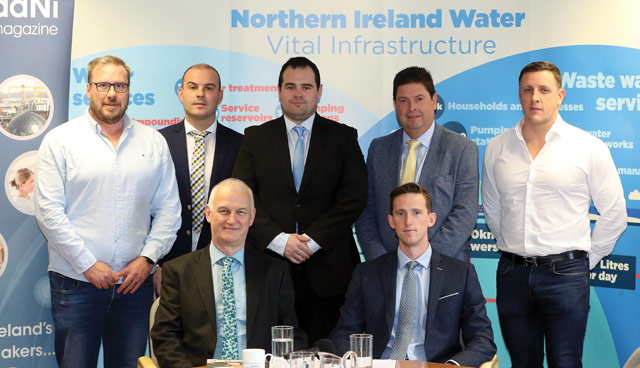No drains, no cranes: Enabling the development that Northern Ireland needs
Round table discussion

NI Water hosted a round table discussion with key stakeholders in the housing development sector to discuss wastewater capacity across Northern Ireland and the impact on development and the wider economy.
Outline the scale of wastewater capacity issues across Northern Ireland and the challenges it presents to your organisation.
Andrew Dunlop
The challenges a lack of wastewater capacity is presenting for us are critically serious. We have advanced a number of sites only to get to the pre-development query and realise that we could go no further. I think that is something that is being experienced across the sector. When looking for a smaller site you’re in trouble because there’s little viability to build a wastewater treatment works and a lot of the larger sites are out of our financial reach. We are struggling and sewerage is our largest problem right now.
Ryan Boyle
Appropriate infrastructure is a fundamental enabler of Northern Ireland’s construction industry and any future growth ambitions. NI Water recently noted that 70 per cent of its network is over 50 years old and it has a legacy of underinvestment. That is a startling figure and we are acutely aware of its significance, having five significantly scaled investments across the province providing both social housing alongside private home development and those projects are all in obeyance at this moment in time, awaiting on an outcome of how we move forward with Price Control 2021 (PC21).
Mark Hardy
As consultants working for the bigger developers in Northern Ireland, we are being challenged to help them through a difficult situation. We’re seeing a scenario where sites are being purchased on the back of permitted development rights (PDs) but when these PDs expire after a year, it’s back to a network capacity check and that is happening on sites from five houses up to 700 houses. It’s slowing development and the situation will not improve without innovative design to assist the system.
We can’t have a replay of what happened in PC15 in PC21 or that would close down so much of Northern Ireland it’s frightening.
— Paul Harper
David Magee
In January, NI Water shared some statistics that 52 towns in Northern Ireland are on development freeze due to no wastewater capacity, 21 sites are on a partial freeze and 10 sites are still to be upgraded in the Price Control 2015 (PC15) period. I believe those figures should be a worry for the local development plans (LDPs) being rolled out by local authorities. Councils need to acknowledge that some of these areas exist within their boroughs and they should be considering how they are going to fund improvements of these systems. We’re treading carefully on any land that we are looking at for development and it’s worrying, given that as we are an investor in larger sites (200+ homes), the capacity check done at concept may look very different when eventually granted planning approval.
Paul Harper
The challenges posed by ageing infrastructure and subsequent development constraints in a number of towns are not new. In 2013, our Price Control 2015 (PC15) funded progress on 19 large wastewater treatment works across Northern Ireland but there were 81 works that were deferred because of a lack of funding. This means that we started off this current period with at least 81 areas that were at risk of not having capacity. As we look towards our next business plan, we’re doing deeper analysis on the network and the wastewater treatment works to provide a better picture of capacity availability and constraint. That is indicating that, of the 271 large wastewater treatment works that serve 90 per cent of the population in Northern Ireland, 99 are now either at or approaching full capacity and a further 33 will reach capacity by 2027. We fully recognise how these constraints impact on growth in Northern Ireland and our business plan is focussed on supporting the economy. Essentially that comes down to funding.
I think it’s essential that NI Water be facilitated to borrow, like every other water company across the water are able to do. Without this, it looks like a catastrophic outcome for the Northern Ireland economy.
— Andrew Dunlop
Where is the challenge recognised as most acute and what are the main causes of capacity restriction?
Paul Harper
Taking Belfast as an example, the Belfast Wastewater Treatment Works is having to run at 140 per cent of its design capacity. In some towns and villages, the challenge is greater. Each area has unique challenges. In Limavady, for example, the problem lies in the spine network of the sewerage system. In Newtownards, it’s about getting the pipework down to a connection point and in Larne the wastewater treatment works has no capacity left. We’re keeping all of these going against the odds and that’s the reality of where we are. We continue to carry out further investigations across Northern Ireland to inform our future business plan to be submitted at the end of January next year.
David Magee
A lot of our construction would be outside of Belfast but we are very aware of the issues that surround the city. Belfast City Council has aspirations to increase city centre living to 70,000 people and develop an additional 37,000 new homes in the period to 2035. Given that the planning system in Belfast is proactive, the probability is that a lot of the money secured by NI Water in its coming Price Control will probably be spent in Belfast and that’s worrying for other regions. Installing our own wastewater treatment plants is a solution but in smaller towns and villages it raises questions about viability when you consider things like the potential loss of land to infrastructure. I suspect the challenges for us around the province are going to ratchet up somewhat in the next period.
Andrew Fraser
The future of our company relies on the development of zoned lands in Newtownards and Belfast. Neither will be possible until NI Water receives the necessary funding to ensure development continues across the country. Waste Water Treatment Works (WWTW) are not always suitable, therefore infrastructure improvements are the only option in certain cases.
Inevitably, developers are dipping in to their own pockets and passing those costs on to the customer. That’s wrong, particularly as we are being pushed to develop affordable housing solutions.
— Ryan Boyle
Ryan Boyle
We have a current site which we are being told it will take 18-24 months to understand what the capacity model will be. With so many areas of stress identified, what investment is being allocated to model those networks amidst increasing planning demand to allow developers to understand it?
Paul Harper
Modelling is a very complex process and there is a lot of work that goes in ensuring there is a full understanding of the network, its capacity and the wider impacts of connection. There are some 1,030 wastewater treatment works in Northern Ireland, which means at least the same number of drainage areas, each of which could need a model. Models are expensive and we are prioritising models to the capacity challenges in the sewerage system of the over 100 wastewater treatment works at or nearing capacity and where funding, which comes from the non-domestic tariff and the block grant, isn’t there to upgrade these by 2027. In our business plan we are assessing a submission based on the current tariff and that has implications not just for housing development but industry and projects such as schools. We have been involved in some really difficult pieces of work to facilitate the connection of hospitals for example. It’s why we are stressing that a shortfall in funding is currently, and will in the future, have wider economic impacts.
What impact is capacity restriction having on building and development across Northern Ireland and the wider economy?
David Magee
The province is struggling as a result. We’re faced with a housing shortage and indicators suggest we should be building 9,000 homes a year but we’re not even close to that and I dread to think of the impact on the network if we were. I think there are other bodies involved that need to step up to the mark to produce some of the much-needed finance. Inevitably, developers are dipping in to their own pockets and passing those costs on to the customer. That’s wrong, particularly as we are being pushed to develop affordable housing solutions. In contrast, in England, infrastructure is being laid to encourage builders to build. Northern Ireland appears to be always lagging behind in terms of producing the finance to make the province work better.
Andrew Dunlop
When it comes to storm infrastructure, it’s almost accepted now that developers are attenuating. There’s almost an unofficial tax or levy of around £2,500 per house to allow for bigger pipes. Those costs have an impact on development and inadvertently the wider economy. Is there a possible solution in using this type of money to give directly to NI Water to upgrade the system?
The future of our company relies on the development of zoned lands in Newtownards and Belfast. Neither will be possible until NI Water receives the necessary funding to ensure development continues across the country.
— Andrew Fraser
Paul Harper
We’re continually working with developers to form potential solutions and the current situation is not one we like being in as we recognise our role as an enabler of the economy. Taking the construction industry as an example, we understand that there is a two-fold impact of the lack of capacity. On one hand developers can’t build, but this also has knock-on impacts in the engineering sector. There should be a wider appreciation that if we can’t connect a potential building in say Belfast, then that could be a few hundred tech jobs and that results in missing tax revenue for the whole economy. There’s a full-cycle economic impact of underinvestment.
Ryan Boyle
There’s an obvious knock-on from restrictions on developers to contractors, suppliers etc. They are nervous about the level of future work and as a result the threat of job losses is very real and very close.
How can the challenges presented by a lack of wastewater capacity be met? Is there a role for the private sector in meeting the investment challenge?
Andrew Fraser
When you look across to England, where sustainable urban drainage systems (SuDs) are widely used and very successful, there is little reason why such an approach cannot be adopted here. Yes, there is a risk regarding third party management but with the right controls in place there is a clear benefit for everyone involved.
Paul Harper
The SuDs conversation is one that we are constantly involved in. NI Water is a great believer in SuDs and the environmental benefits associated with it. In fact, we’ve won awards for some of our SuDs projects but there remain questions around maintenance and the ability to adopt, in terms of wider usage. These are questions that we are asking ourselves.
We’re close to a moratorium on housing development and it is paramount to the industry and the wider economy that this isn’t the case.
— Mark Hardy
Mark Hardy
In our experience the soft SuDs engineering solutions are some 66 per cent cheaper than the hard engineering solutions. We’ve worked on quite a few sites, albeit private developments, where we have introduced a number of innovations including detention basins with large volumes of storage. There is definitely an opportunity to free up capacity through the wider rollout of SuDs.
Another potential solution is the separation of discharge from the combined infrastructure network. We know that foul discharge is minimal compared to storm discharge but currently they are combining in terms of capacity. A storm separation solution could have a major impact on development opportunity.
Ryan Boyle
Undoubtedly the main catalyst for addressing the underinvestment in infrastructure to date is funding. That funding is necessary now but it will take time and resources to turn that around in to productivity on the ground. However, I do believe in the meantime that there are quick wins available in terms of greater transparency in modelling and network capacity checks and in a boost to resources. In recent years NI Water has reduced staff levels by around 50 per cent in efficiency savings but that is coming at a cost in terms of turnaround times for applications and impacting many of us responsible for the delivery of the large number of houses in Northern Ireland.
In terms of private sector investment, I believe that if developers or contractors have the ability to install their own wastewater treatment plant on site then they should do that. However, this requires much greater clarity and surety around things like how funding would be returned to developers and the speed at which such projects are adopted. Where is the working group representing house builders, who along with NI Water could focus our design information for better all-round results?
David Magee
I agree with Mark that there is a need for a clearer pathway to SuDS utilisation. Developers for some years have had to deploy management companies for developments to ensure green space is cared for and self-sufficient. There is no reason why SuDS can’t be integrated in to these spaces. I also think there could be better inter-governmental collaboration between the various governmental bodies to ensure that the private developer is a part of the conversation when discussing potential solutions.
Paul Harper
It’s worth noting that we continue to invest significantly in maintaining and keeping to an operational standard those existing wastewater treatment works in areas where we do have capacity. In regards to quick wins, we aim to be responsive to the demands upon us and have recently altered some of our processes to try and speed up that exchange of information both to us and from us. We’re currently tendering for a £1 million investment in a digital system to assist us with that.
We continue to look at the removal of stormwater to free up additional capacity in the wastewater network and we continue our plans to pilot some Green SuDS initiatives, but these all need to be done with a holistic view to our wider operations and funding. In an ideal world, private developers would not be required to build their own wastewater treatment works but we have to deal with that reality. To ensure we’re assisting those developers to the best of our ability I’ve asked my team to look at standardised designs of such works which we can advise developers on.
Identify one priority area of focus going forward to meet the wastewater capacity challenge
Paul Harper
Funding. In 2015, as preparation for our PC15 business plan submission, we identified a total £2.8 billion need for investment in the water and wastewater infrastructure across Northern Ireland . However, we had a final determination of just £990 million for the six-year period 2015 to 2021 and today we’re a further £64 million under-funded against that revised figure. Looking towards our next business plan, PC21 for the period 2021 to 2027, indications are that some £3.4 billion of capital investment is needed for Northern Ireland, including greater Belfast, which now falls under its own Living With Water Programme, and requires around £1 billion in its own right. We are recommending that £2.5 billion is made available, we can’t have a replay of what happened in PC15 in PC21 or that would close down so much of Northern Ireland it’s frightening.
Andrew Fraser
Funding is obviously crucial and while I doubt the amount required will be received, it needs to be significantly larger than the previous settlement. In addition, the structure of NI Water should be changed to allow the company to borrow. Continued growth in the construction sector is critical to the growth of our economy.
David Magee
Funding is the problem and it’s been proven that the block grant is not providing enough finance to put the system right. I think mechanisms need to be put in place to allow the water utility to create funding to deal with the problem or else we are staring at an even greater housing problem. There is a need for smarter thinking around how we fund water and wastewater infrastructure in the knowledge that the block grant is not sufficient.
Mark Hardy
I’d point to better forward-planning and better engagement between the statutory authorities, recognising that this challenge is wider than one for NI Water to deal with alone. I also recognise the need for a smarter funding method to assist in development. We’re close to a moratorium on housing development and it is paramount to the industry and the wider economy that this isn’t the case.
Inevitably, developers are dipping in to their own pockets and passing those costs on to the customer. That’s wrong, particularly as we are being pushed to develop affordable housing solutions.
— David Magee
Paul Harper
The perverse thing is that if housing developers were to switch their focus to those areas where wastewater capacity currently exists, mainly in small towns and villages, then those areas would very quickly reach critical levels. That’s why it’s important to state that the challenge is much wider than working to increase capacity at certain pressure points. We need broad investment, however, when we submit our business plan, we’re competing for funding with the likes of education and healthcare and that’s the difficult conversation we are having.
Ryan Boyle
I agree that funding is going to be difficult and we’re happy to assist in applying political pressure and voice those concerns because we realise that it’s not about ensuring that NI Water is adequately funded, but that the Northern Ireland economy is enabled to grow. However, in the interim we can’t bury our heads. In this fragile economy, which is so susceptible to small changes, we need to come up with an interim plan to make the best of what we have, at least until the Price Control funding comes about or NI Water is facilitated to access funding from other sources.
Andrew Dunlop
I think it’s essential that NI Water be facilitated to borrow, like every other water company across the water are able to do. Without this, it looks like a catastrophic outcome for the Northern Ireland economy. Our economy is delicate and construction is a vital part of it; any slowdown will have an impact. In the interim, I would prioritise the need for greater transparency of funding coming down the line as we are an industry that requires certainty around where we can build.
Participants
Ryan Boyle
Ryan Boyle has been a Director and Chief Operating Officer of Braidwater Group for over 10 years. Ryan started his career with Braidwater as a quantity surveyor and site manager in 2004. His knowledge of the industry and hands on approach ensures efficient management practices which have contributed to Braidwater’s growth into one of Northern Ireland’s leading house builders.
Andrew Dunlop
Andrew Dunlop is the Managing Director of Dunlop Homes, a family owned County Down property development company, now in its 90th year. Andrew is an a NHBC winner with over 20 years’ experience in the building industry.
Andrew Fraser
Andrew Fraser is a Director of Fraser Houses NI Ltd, a third generation, family owned business with over 5,000 homes constructed across Northern Ireland.
Mark Hardy
Mark Hardy is a founding Director and lead engineer in Marrac Design Ltd. Mark has over 20 years’ experience in the industry with specialist experience in road and drainage design for residential, industrial and commercial developments.
Paul Harper
Paul Harper is a chartered civil engineer and a water industry expert with some 35 years’ experience, primarily in the UK. Paul’s role includes leading the transformation of capital planning and investment in NI Water. His previous role was as the Water Asset Management Lead in a major UK consultancy and he has worked for a range of water companies in the UK and Ireland, including Irish Water.
David Magee
David Magee commenced work with Antrim Construction Company in 1985 as a trainee site engineer and has progressed through the ranks to his current position as Building Director. David is also the Chair of the Construction Employers Federation’s (CEF) Private Housing Committee.











